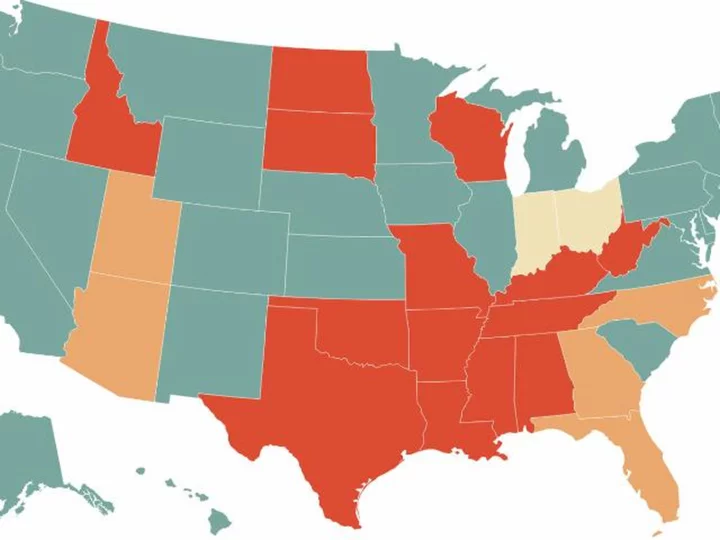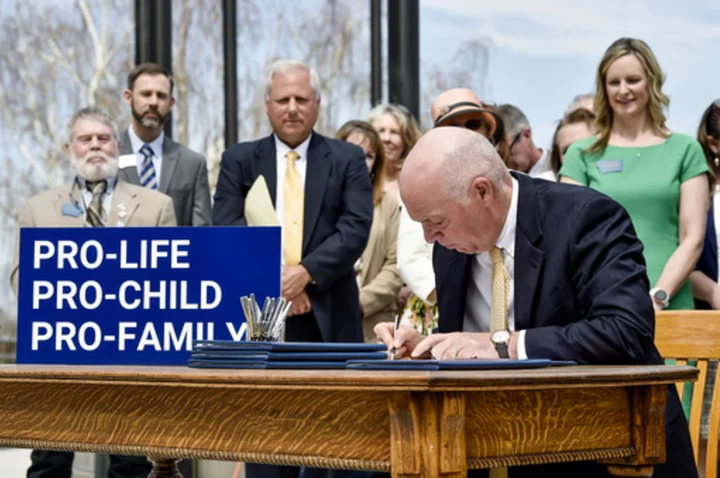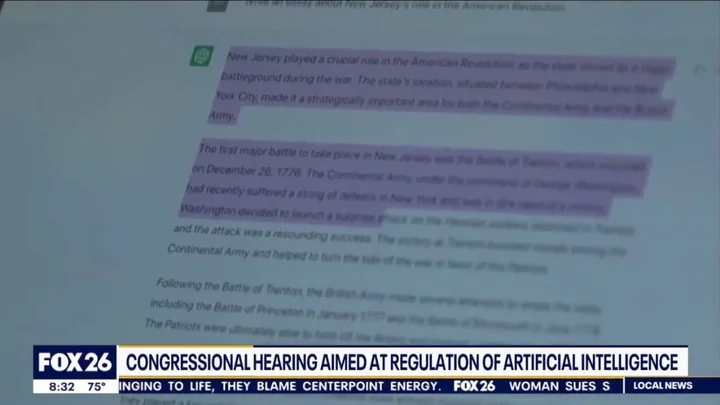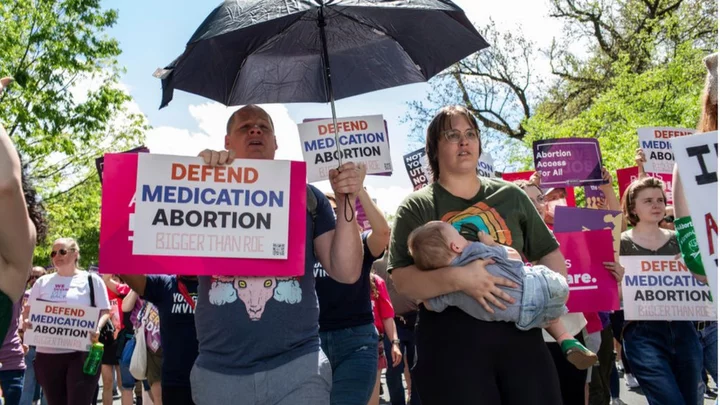
The abortion access map is being dramatically redrawn this week
The evolving patchwork of access to abortion care is going through big changes this week, with the entire Southeast on the brink of imposing new limits.
2023-05-18 02:20

Planned Parenthood asks Montana judge to block law that bans 2nd-trimester abortion method
Planned Parenthood of Montana asked a judge to temporarily block a law that bans the abortion method most commonly used after 15 weeks of gestation
2023-05-18 00:58

AI's 'ideal body type' sparks debate across social media
As we now know, artificial intelligence has a mind of its own – and now it's dictating what the 'ideal body type' is. A recent study by The Bulimia Project asked AI software Dall-E 2, Stable Diffusion, and Midjourney to design what social media would consider the perfect man and woman. Inevitably, the results were largely "unrealistic" and couldn't be more distorted if they tried. And it goes without saying, the so-called "perfect" person does not exist. When it came to women, the AI images swayed towards blonde hair, brown eyes and olive skin. AI-generated men, however, had a bias towards brown hair, brown eyes and olive skin. Sign up for our free Indy100 weekly newsletter The string of images soon went viral across social media, and it didn't take long for users to chime in on AI's "problematic" take, with one writing: "The male look is actually very unhealthy." Another joked: "So, AI is basically a 14-year-old boy with no friends?" A third added: "So I need to look like I'm made of wax?" Many more slammed the software's racial bias, with the vast majority being Caucasian. "How is AI already racist?" One person asked while another said: "So the AI is also racist. I am shocked." The Bulimia Project said: "Considering that social media uses algorithms based on which content gets the most lingering eyes, it's easy to guess why AI's renderings would come out more sexualised. "But we can only assume that the reason AI came up with so many oddly shaped versions of the physiques it found on social media is that these platforms promote unrealistic body types, to begin with." Have your say in our news democracy. Click the upvote icon at the top of the page to help raise this article through the indy100 rankings.
2023-05-18 00:58

Kraft Heinz wants you to mix flavors in your ketchup
Nearly 15 years ago, Coca-Cola starting letting soda fans mix their own flavors with its Freestyle fountains. Now, Kraft Heinz wants to do the same for dipping sauces.
2023-05-18 00:56

What comes next for abortion pill in US?
A court in New Orleans is hearing a case that may pull a commonly used abortion pill from the market.
2023-05-18 00:55

Marc Lasry Says Pickleball Offers Better Rate of Return Than NBA
Marc Lasry, the billionaire co-founder of Avenue Capital Group, said he expects investments in upstart sports leagues like
2023-05-18 00:53

A crucial deal aimed at averting a global food crisis has been extended. Here's everything you need to know
A crucial deal aimed at averting a global food crisis following Russia's invasion of Ukraine has been extended for two months.
2023-05-18 00:48

'Fast X' review: How do you top blasting a car into space? Two words: Jason Momoa.
The Fast and Furious franchise has expanded intensely over the course of its 11 films
2023-05-18 00:15

Harry, Meghan in 'near catastrophic' NY paparazzi car chase, spokesperson says
By Michael Holden LONDON (Reuters) -Britain's Prince Harry, his wife Meghan and her mother were involved in a "near catastrophic
2023-05-17 23:56

North Carolina Republicans approve 12-week abortion ban as sweeping restrictions spread across US South
Republican lawmakers in North Carolina voted to override the governor’s veto of a bill that outlaws abortion at 12 weeks of pregnancy, restricting abortion access in a state that has been a haven for abortion care in the year after the US Supreme Court’s decision to reverse Roe v Wade. In neighbouring South Carolina, lawmakers have continued debate before voting on a more-restrictive measure that would ban nearly all abortions after roughly six weeks of pregnancy, before many people know they are pregnant, adding to a streak of abortion restrictions across the US South. More than a dozen states, mostly in the South, have outlawed most abortions or severely restricted access within the year after the Supreme Court’s ruling in Dobbs v Jackson Women’s Health Organization, which revoked a constitutional right to abortion care that was affirmed for nearly half a century. Abortion rights restrictions in North Carolina and a six-week ban in South Carolina would dramatically change the map for abortion access in the US, where abortions are banned in most cases from Texas to West Virginia and along the Gulf Coast. “In the more than a dozen states with bans, women have been turned away from emergency rooms, left with no choice but to travel hundreds of miles for the care they need, and faced complications that put their lives and health at risk. Like those laws, the North Carolina ban will harm patients and threaten doctors for providing essential care,” White House press secretary Karine Jean-Pierre said in a statement on 17 May. She called the North Carolina measure a “dangerous bill that is out of touch with the majority of North Carolinians and will make it even more difficult for women to get the reproductive health care they need.” “We’ve already seen the devastating impacts that state abortion bans have had on the health and lives of Americans living under these draconian laws,” she added. Health workers joined protesters at the North Carolina Capitol in Raleigh on 17 May as lawmakers in the Republican-controlled state legislature convened to override a veto from Democratic Governor Roy Cooper, who has spent the last several days campaigning for GOP lawmakers to break from the party and drop the challenge to his veto. In a video posted online, the governor named four Republican lawmakers who he said made campaign promises to protect access to abortion. “They say this is a reasonable 12-week ban. It’s not,” he said in the video. “The fine print requirements and restrictions will shut down clinics and make abortion completely unavailable to many women at any time, causing desperation and death.” Much of the coverage surrounding the North Carolina legislation has centred around a now-Republican lawmaker who previously campaigned against abortion restrictions when she was a Democrat, up until April. State Rep Tricia Cotham joined the Republican Party last month after campaigning for her seat as a Democratic candidate and earning the endorsement of EMILY’s List, an influential abortion rights organisation. Her party switch delivered Republicans a veto-proof majority in the House. Ms Cotham has spent years campaigning against abortion restrictions, with powerful testimony about abortion rights and her own medically necessary abortion experience, saying in one widely shared 2015 speech that “my womb and my uterus is not up for your political grab.” In a statement following the vote, the governor said that “North Carolinians now understand that Republicans are unified in their assault on women’s reproductive freedom, and we are energized to fight back on this and other critical issues facing our state.” Lawmakers in the House and Senate voted on party lines to reverse the governor’s veto. The bill includes exceptions for pregnancies from rape or incest or if there is a “life-limiting anomaly” in the fetus. It also will require in-person physician visits at least 72 hours before a procedural abortion, and doctors must also make real-time views of fetuses available and allow patients to listen to embryonic cardiac activity. North Carolina lawmakers approved the anti-abortion law while lawmakers in Nebraska debated a measure that coupled a 10-week abortion ban with a bill targeting gender-affirming care for trans youth, a proposal that inspired a nearly three-month-long filibuster in an effort to block it. Republican lawmakers ultimately broke through the filibuster on Tuesday night and voted in favour of the combined bill, which will head to a final round of votes before it heads to the desk of Republican Governor Jim Pillen, who intends to sign it into law. Meanwhile, in Louisiana, lawmakers recently refused to add rape and incest exceptions to its anti-abortion law, one of the most restrictive in the country. State lawmakers also overwhelmingly rejected attempts to clarify medical exceptions in the law, including a measure that would specifically allow providers to remove an ectopic or molar pregnancy, which cannot result in a successful birth. Read More Nebraska Republicans approve combined gender-affirming care ban and anti-abortion bill after epic filibuster Anti-abortion laws harm patients facing dangerous and life-threatening complications, report finds
2023-05-17 23:51

Ukraine grain deal to be extended for 2 months
An agreement has been reached to extend a deal that allows grain to be exported from Ukrainian ports in the Black Sea, according to Turkish and Ukrainian officials.
2023-05-17 23:48

Uma Thurman's son Levon is spitting image of her as they pose together at Cannes Film Festival
Uma Thurman and her doppelganger son Levon Hawke made a striking entrance at the 76th Cannes Film Festival
2023-05-17 23:47
